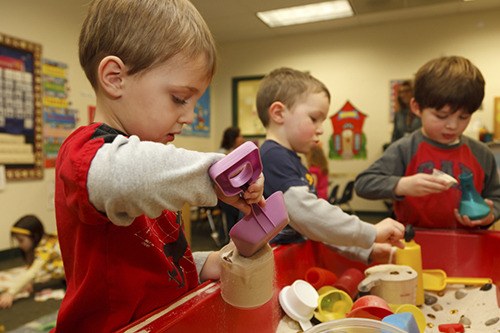To have your child ready for life, you need to begin in his earliest years.
The skills your child learns in the first three years of life set the stage for future learning and successful adult lives. Research is showing that adults who have certain skills can find and keep jobs and earn their way out of poverty. Adolescents who have certain skills can make better decisions about their behaviors. Children with certain skills will be able to follow directions and focus, take turns and even regulate youthful impulses in preschool and school.
Let’s just look at the skills needed by children and how we can help them. When I say “we,” I mean that literally. Active, involved, loving parents are a critical beginning to gain these skills. One mom told me a long time ago that she didn’t realize she was so important. She is. She is a key to the child gaining the skills to learn.
Even grandparents, neighbors and older siblings play a great part in this learning. Even people who don’t have much contact with young children have a major role in how they support early learning and public schools.
So how does this learning take place? It begins at the beginning.
A baby’s brain develops as he interacts with his primary caregivers (usually parents). It begins when the child cries and the parent responds with care and concern.
It begins when the child learns to depend on getting a response and an appropriate one. When that doesn’t happen and the response from the parents is unreliable, inappropriate or just not there, the brain is disrupted and later learning and behavior and even health may be negatively impacted (“The Science of Neglect: The Persistent Absence of Responsive Care Disrupts the Developing Brain,” 2012).
This positive response and interaction between children and their caregivers continues as they become toddlers and into the preschool years. Now, greater numbers of outsiders participate in being responsive to the young child. But all of these professionals and teachers help build the child’s positive brain development through reciprocal, responsive relationships. This means responding to the child in a positive way.
So what does this all mean? This is just the beginning of helping to shape the child’s brain but it is critical. Parents and other caregivers need to understand their importance or they can undermine the child’s early progress. Stress and trauma put the child at risk. Poverty can be a major factor. The depression of the mother during pregnancy and immediately after can hinder the child’s development.
Other issues put huge stresses on a child. These are issues like abuse and/or neglect, adult substance abuse, domestic violence, a death or a primary caregiver going to jail. Each of these disrupt the child’s brain development and derail the learning that should be happening. When these kinds of experiences happen, they lead to health and mental health problems over a person‘s lifetime.
These experiences cause delays in the child’s development. The more negative the experiences, the greater the risk the child will have these delays.
But what does this have to do with the rest of us? We are all involved with one another. It happens as we reach out to help the unfortunate in our society. The more people who have problems, the more help that is expected from all of us. We all have a stake in all children’s health. We all are impacted when children aren’t healthy or when they are unable to find jobs as they mature. When a child is not healthy because of what caregivers have not provided him, it really isn’t his fault. We have caused the bad outcome.
Now we need to be involved in fixing it. It is totally clear that we will save effort, money and community resources if we can prevent problems rather than to fix them.
In many ways, to fix problems early or to prevent problems is the more acceptable outcome. And most people are willing to help children and less willing to help them as they grow older.
Reaching out to help parents understand their importance and their impact on the child they are raising may enable us to make great positive difference for our children.
What does all this mean? Love, pay attention and treat your baby right. These first years are incredibly important.
Cynthia Martin is the founder of the First Teacher program and director of Parenting Matters Foundation, which publishes newsletters for parents, caregivers and grandparents. Reach Martin at pmf@olypen.com or at 681-2250.


